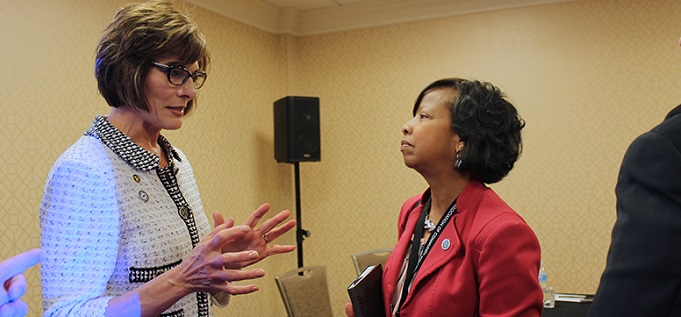Engaging the board to act on completion
By Ellie Ashford
May 2, 2018
Boards of trustees are increasingly interested in looking at performance outcomes data. But what happens next?
Community colleges that have engaged their boards in using data to drive institutional change shared their experiences at a session at the American Association of Community Colleges’ (AACC) annual convention on Sunday.
The longer trustees have served, the more likely they are to understand the community college’s mission and how data can be used to advance that mission, said Shah Ardalan, president of Lone Star College-University Park in Texas, who reported on the results of a survey of community college trustees in Texas.
Colleges with higher graduation rates were more likely to have trustees with advanced degrees, Ardalan said. And the more experiences that trustees had, the higher the graduation rate.
The most interesting finding, however, Ardalan said, is that trustees who used data the most tended to be at colleges that had the lowest graduation rates. What that means, he suggested, is that the use of data doesn’t always lead to effective policies.
He recommended that trustees focus more on using their knowledge and experiences to monitor continuous improvement.
A board’s wakeup call
The board of trustees at San Jacinto College (Texas) had “a day of awakening” during a board institute in 2007 when they looked at the data and learned that the college was losing more than half its students every year, said Chancellor and CEO Brenda Hellyer. From that point, the board began shifting its focus “from being in the weeds of operations to continuous improvement and long-term planning,” she said.
“They publicly apologized at a board meeting for not fulfilling their goals,” she said. “It was painful. They wanted data but we didn’t have it.” The college didn’t have an institutional research department, so establishing one became a top priority.
“The trustees had a sense of urgency. But they didn’t understand the culture of the college,” Hellyer said. “We had to create a conversation about long-term work.”
At another board institute in 2009, the trustees began mandating best practices, such as eliminating late registration. Faculty and staff were nervous about that, but it wasn’t as bad as people expected, Hellyer said.
A strategic plan created in 2010, and updated periodically, “drives transformational change,” Hellyer said. “Now everything the college does is focused on strategic goals, core values, vision and mission.”
Annual priorities are aligned with the strategic plan. Teams and individuals develop key performance indicators tied to those priorities.
“We engage everybody,” Hellyer said. All faculty and department heads have access to a data dashboard, so they know course success rates, how many students fail to complete, how many fail to persist fall to fall, how many fail to earn any credits the first semester and other statistics. The measures are broken down by gender, race, ethnicity and other factors.
All those changes have led to significant improvements. Over the past 10 years the number of degrees and certificates awarded annually increased from about 2,800 to 7,500. Enrollment growth during that period was only 1 percent to 2 percent.
As a result of having more robust data, the board set the following policy priorities:
- A compensation system based on performance was adopted.
- Education planners were assigned to high schools.
- Textbook costs were reduced by adopting more online educational resources.
- A campus golf course was closed, and four competitive athletic programs were eliminated.
- The college increased its investment in facility upgrades.
“The board needs to know we are taking student success seriously,” Hellyer said. There are conversations about student success at every meeting, “and we’re not just showing them the good stuff, but where we need to improve.”
The result is a culture where the board and administration can work together to focus on student success in a spirit of harmony, she said.
There’s more to the story. Find out how Jackson College uses data to drive success in CC Daily.


